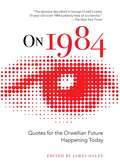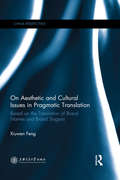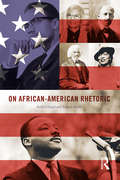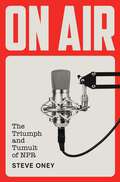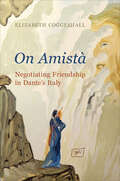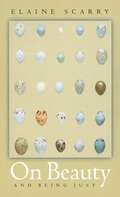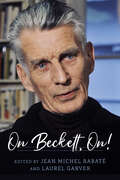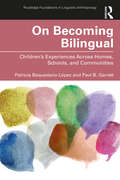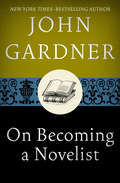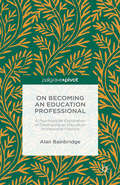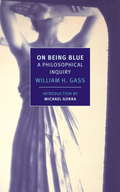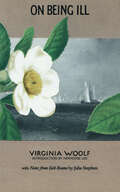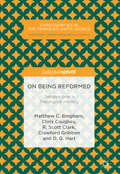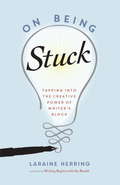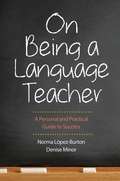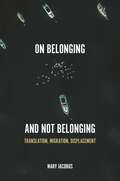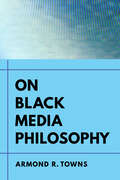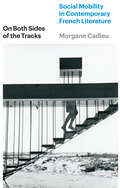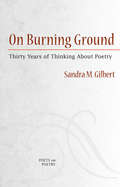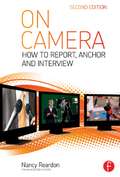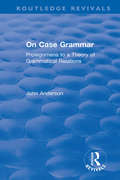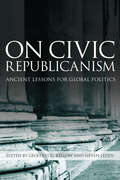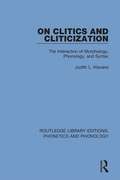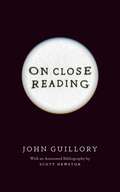- Table View
- List View
Omnibus IV: The Ancient World
by Douglas Wilson Gene Edward Veith G. Tyler FischerOmnibus IV is one of the series of four books that covers the ancient world, medieval period, the reformation period and now the this one that covers the ancient world all over again sequentially. It targets the developed mind as it offers challenging work to its readers enriching them with knowledge and wisdom in extensive capacities. The history is written in a way that engages the readers to love the study and to indulge in the book enthusiastically.
On 1984: Quotes for the Orwellian Future Happening Today
by Daley James EditorFake news, manufactured paranoia, and an encroaching totalitarian state. Have we arrived in 1984? George Orwell’s dystopian classic, 1984, was written as a warning for democracies to be on guard against the signs of fascism and totalitarianism. At the time, readers believed those dark days were relegated to history. But these days, the United States is displaying all the signs of the Orwellian nightmare. President Donald Trump presides over a drastically divided nation. While some believe his tweets and alternative facts, a large portion of the populace is struggling to resist his administration’s relentless onslaught against our democracy. Both chilling and hopeful, On 1984 offers a broad range of quotations that are as resonant today as they were in Orwell’s times. Editor James Daley introduces the volume and organizes the quotes in sections that reflect our troubled times: Fake News and Alternative FactsBad HombresDraining the SwampOrder and StrengthResistance
On Aesthetic and Cultural Issues in Pragmatic Translation: Based on the Translation of Brand Names and Brand Slogans (China Perspectives)
by Xiuwen FengThis book focuses on the cross-cultural advertising communication and aesthetic issues of brands and brand slogans. Based on the pragmatic translating theories and case studies of a few classic brand translations, the book puts forward the Three Aesthetic Principles of translating brands. The book special features the cultural in addition to the business aspect of introducing China Time-honored Brands to foreign markets. Readers will learn about the great importance of the aesthetic issues and cultural communications in translating brands and brand slogans through this book.
On African-American Rhetoric
by Keith Gilyard Adam J. BanksOn African-American Rhetoric traces the arc of strategic language use by African Americans from rhetorical forms such as slave narratives and the spirituals to Black digital expression and contemporary activism. The governing idea is to illustrate the basic call-response process of African-American culture and to demonstrate how this dynamic has been and continues to be central to the language used by African Americans to make collective cultural and political statements. Ranging across genres and disciplines, including rhetorical theory, poetry, fiction, folklore, speeches, music, film, pedagogy, and memes, Gilyard and Banks consider language developments that have occurred both inside and outside of organizations and institutions. Along with paying attention to recent events, this book incorporates discussion of important forerunners who have carried the rhetorical baton. These include Frederick Douglass, Harriet Jacobs, Sojourner Truth, Anna Julia Cooper, W. E. B. Du Bois, Zora Neale Hurston, Malcolm X, Martin Luther King, Jr., Toni Cade Bambara, Molefi Asante, Alice Walker, and Geneva Smitherman. Written for students and professionals alike, this book is powerful and instructive regarding the long African-American quest for freedom and dignity.
On Air: The Triumph and Tumult of NPR
by Steve OneyAn epic, decade-long reported history of National Public Radio that reveals the unlikely story of one of America&’s most celebrated but least understood media empires.Founded in 1970, NPR is America&’s most powerful broadcast news network. Despite being overshadowed by the larger and more glamorous PBS, public radio has long been home to shows such as All Things Considered, Morning Edition, and This American Life that captivate millions of listeners in homes, cars, and workplaces across the nation. NPR and its hosts are a cultural force and a trusted voice, and they have created a mode of journalism and storytelling that helps Americans understand the world in which we live. In On Air, a book fourteen years in the making, journalist Steve Oney tells the dramatic history of this institution, tracing the comings and goings of legendary on-air talents (Bob Edwards, Susan Stamberg, Ira Glass, Cokie Roberts, and many others) and the rise and fall and occasional rise again of brilliant and sometimes venal executives. It depicts how NPR created a medium for extraordinary journalism—in which reporters and producers use microphones as paintbrushes and the voices of people around the world as the soundtrack of stories both global and local. Featuring details on the controversial firing of Juan Williams, the sloppy dismissal of Bob Edwards, and a $230 million bequest by Joan B. Kroc, widow of the founder of McDonalds, On Air also chronicles NPR&’s daring shift into the digital world and its early embrace of podcasting formats, establishing the network as a formidable media empire. Fascinating, revelatory, and irresistibly dishy, this is a riveting account of NPR&’s unlikely launch, chaotic ascent, and ultimate triumph—a must-read for anyone interested in the history of public radio and its impact on American culture.
On Amistà: Negotiating Friendship in Dante’s Italy (Toronto Italian Studies)
by Elizabeth CoggeshallAlthough we often think of friendship today as an indisputable value of human social life, for thinkers and writers across late medieval Christian society friendship raised a number of social and ethical dilemmas that needed to be carefully negotiated. On Amistà analyses these dilemmas and looks at how Dante’s strategic articulations of friendship evolved across the phases of his literary career as he manoeuvred between different social groups and settings. Elizabeth Coggeshall reveals that friendship was not an unequivocal moral good for the writers of late medieval Italy. Instead, it was an ambiguous term to be deployed strategically, describing a wide range of social relationships such as allies, collaborators, servants, patrons, rivals, and enemies. Drawing on the use of the language of friendship in the letters, correspondence poems, dedications, narratives, and treatises composed by Dante and his interlocutors, Coggeshall examines the way they skillfully negotiated around the dilemmas that friendship raised in the spheres of medieval Italian literary society. The book addresses instances of inclusivity and exclusivity, collaboration and self-interest, hierarchy and equality, and alterity and identity. Employing literary, historical, and sociological analysis, On Amistà presents a genealogy for the innovative and tactical use of the terms of friendship among the works of late medieval Italian authors.
On Beauty and Being Just
by Elaine ScarryHave we become beauty-blind? For two decades or more in the humanities, various political arguments have been put forward against beauty: that it distracts us from more important issues; that it is the handmaiden of privilege; and that it masks political interests. In On Beauty and Being Just Elaine Scarry not only defends beauty from the political arguments against it but also argues that beauty does indeed press us toward a greater concern for justice. Taking inspiration from writers and thinkers as diverse as Homer, Plato, Marcel Proust, Simone Weil, and Iris Murdoch as well as her own experiences, Scarry offers up an elegant, passionate manifesto for the revival of beauty in our intellectual work as well as our homes, museums, and classrooms. Scarry argues that our responses to beauty are perceptual events of profound significance for the individual and for society. Presenting us with a rare and exceptional opportunity to witness fairness, beauty assists us in our attention to justice. The beautiful object renders fairness, an abstract concept, concrete by making it directly available to our sensory perceptions. With its direct appeal to the senses, beauty stops us, transfixes us, fills us with a "surfeit of aliveness." In so doing, it takes the individual away from the center of his or her self-preoccupation and thus prompts a distribution of attention outward toward others and, ultimately, she contends, toward ethical fairness. Scarry, author of the landmark The Body in Pain and one of our bravest and most creative thinkers, offers us here philosophical critique written with clarity and conviction as well as a passionate plea that we change the way we think about beauty.
On Beckett, On!
by Jean–Michel Rabaté Laurel GarverThis collection of essays was born from a wish to show to a wider audience how exciting and productive Samuel Beckett scholarship has become, at a time when there are more essays and books written about Beckett than about any key modernist authors like Joyce and Woolf. This volume contains numerous essays on Beckett that the Journal of Modern Literature has published in the last decade. Their enduring quality proves that Beckett's oeuvre has maintained its appeal today because it attracts original scholars who are also interested in issues like philosophy, psychoanalysis, ethics, contemporary history, and literary theory.
On Becoming Bilingual: Children’s Experiences Across Homes, Schools, and Communities
by Paul B. Garrett Patricia Baquedano-LópezOn Becoming Bilingual: Children’s Experiences across Homes, Schools, and Communities provides a theoretical and methodological introduction to research on children’s participation in and across a multiplicity of activities where they display complex linguistic and sociocultural knowledge. From a perspective that engages intersections of language, race, and class, the book reviews foundational and recent studies highlighting innovations, trends, and future directions for research. The book offers a helpful set of resources, including guiding questions at the start of each chapter, links to online and bibliographic sources, discussion questions and activities, and a glossary of key terms. This book is intended for scholars and students in language-oriented fields of study who are interested in learning about how bilingual children engage with, negotiate, and transform their social worlds.
On Becoming a Novelist: On Becoming A Novelist, On Writers And Writing, And On Moral Fiction
by John GardnerThe classic for serious fiction writers: &“The book is the result of John Gardner&’s twenty-odd years of teaching experience, and it shows&” (Anne Tyler). In this essential guide, John Gardner advises the aspiring fiction author on such topics as the value of creative writing workshops, the developmental stages of literary growth, and the inevitable experience of writer&’s block. Drawn from his two decades of experience in creative writing, Gardner balances his compassion for his students with his knowledge of the publishing industry, and truthfully relates his experiences of the hardships that lie ahead for aspiring authors. On Becoming a Novelist is a must-read for those dedicated to the craft and profession of fiction writing. This ebook features a new illustrated biography of John Gardner, including original letters, rare photos, and never-before-seen documents from the Gardner family and the University of Rochester Archives.
On Becoming an Education Professional: A Psychosocial Exploration Of Developing An Educational Professional Practice
by Alan BainbridgeThis book draws together a variety of detailed case studies to demonstrate the unique interaction between the past and the present which occurs within the professional education context. Using a psychosocial approach, Alan Bainbridge suggests that this process of identity or role formation requires the expectations and fantasies of the past to be negotiated at the unconscious, individual and social level. A focus on personal agency and dealing with the complexity inherent in education settings highlights the macro and micro negotiations new education professionals are required to undertake between the margins of the personal and professional to provide a more nuanced model for early professional development.
On Being Blue
by William H. Gass Michael GorraOn Being Blue is a book about everything blue--sex and sleaze and sadness, among other things--and about everything else. It brings us the world in a word as only William H. Gass, among contemporary American writers, can do. Gass writes: Of the colors, blue and green have the greatest emotional range. Sad reds and melancholy yellows are difficult to turn up. Among the ancient elements, blue occurs everywhere: in ice and water, in the flame as purely as in the flower, overhead and inside caves, covering fruit and oozing out of clay. Although green enlivens the earth and mixes in the ocean, and we find it, copperish, in fire; green air, green skies, are rare. Gray and brown and widely distributed, but there are no joyful swatches of either, or any of exuberant black, sullen pink, or acquiescent orange. Blue is therefore most suitable as the color of interior life. Whether slick light sharp high bright thin quick sour new and cool or low deep sweet dark soft slow smooth heavy old and warm: blue moves easily among them all, and all profoundly qualify our states of feeling.
On Being Ill: with Notes from Sick Rooms by Julia Stephen
by Virginia WoolfVirginia Woolf&’s daring essay on how illness transforms our perception, plus an essay by Woolf&’s mother from the caregiver&’s perspective: &“Revelatory.&” —Booklist This new publication of &“On Being Ill&” with &“Notes from Sick Rooms&” presents Virginia Woolf and her mother, Julia Stephen, in textual conversation for the first time in literary history. In the poignant and humorous essay &“On Being Ill,&” Woolf observes that though illness is part of every human being&’s experience, it is not celebrated as a subject of great literature in the way that love and war are embraced by writers and readers. We must, Woolf says, invent a new language to describe pain. Illness, she observes, enhances our perceptions and reduces self-consciousness; it is &“the great confessional.&” Woolf discusses the taboos associated with illness, and she explores how it changes our relationship to the world around us. &“Notes from Sick Rooms,&” meanwhile, addresses illness from the caregiver&’s perspective. With clarity, humor, and pathos, Julia Stephen offers concrete information that remains useful to nurses and caregivers today. This edition also includes an introduction to &“Notes from Sick Rooms&” by Mark Hussey, founding editor of Woolf Studies Annual, and a poignant afterword by Rita Charon, MD, founder of the field of Narrative Medicine. In addition, Hermione Lee&’s brilliant introduction to &“On Being Ill&” offers a superb overview of Woolf&’s life and writing. &“Woolf&’s inquiry into illness and its impact on the mind is paired with her mother&’s observations about caring for the body. Julia Stephen . . . had no professional training but took to heart Florence Nightingale&’s precept that every woman is a nurse and emulated Nightingale&’s best-selling Notes on Nursing with her own &“Notes from Sick Rooms.&” In this long-overlooked, precise, and piquant little manual, Stephen is compassionate and ironic, observing that everyone deserves to be tenderly nursed while addressing the small evil of crumbs in bed. This unprecedented literary reunion of mother and daughter is stunning on many fronts, but physician and literary scholar Rita Charon focuses on the essentials in her astute afterword, writing that Woolf&’s perspective as a patient and Stephen&’s as a nurse together illuminate the goal of care—to listen, to recognize, to imagine, to honor.&” —Booklist &“Woolf and Stephen will certainly change the way readers think of illness.&” —Publishers Weekly
On Being Reformed: Debates over a Theological Identity (Christianities in the Trans-Atlantic World)
by D. G. Hart Crawford Gribben Matthew C. Bingham Chris Caughey R. Scott ClarkThis book provides a focus for future discussion in one of the most important debates within historical theology within the protestant tradition - the debate about the definition of a category of analysis that operates over five centuries of religious faith and practice and in a globalising religion. In March 2009, TIME magazine listed ‘the new Calvinism’ as being among the ‘ten ideas shaping the world.’ In response to this revitalisation of reformation thought, R. Scott Clark and D. G. Hart have proposed a definition of ‘Reformed’ that excludes many of the theologians who have done most to promote this driver of global religious change. In this book, the Clark-Hart proposal becomes the focus of a debate. Matthew Bingham, Chris Caughey, and Crawford Gribben suggest a broader and (they argue) more historically responsible definition for ‘Reformed,’ as Hart and Scott respond to their arguments.
On Being Stuck
by Laraine Herring"Writer's block is not a mysterious force that has aligned with your writing to stop you in your tracks. Writer's block occurs when hope meets fear--when our expectations for a project or ourselves as writers run head first into the fear(s) that are uniquely tied to that hope. Writer's block is not external. It is not part of a vast conspiracy. It is a signal from deep within to pay attention to the writing and to pay attention to what the writing is asking of us as writers. Using deep inquiry, writing, body and breath exercises, and a range of interdisciplinary approaches, On Being Stuck helps writers uncover the gifts hidden within their creative blocks and deepen their relationship not only to their work but to themselves. "
On Being a Language Teacher: A Personal and Practical Guide to Success
by Norma Lopez-Burton Denise MinorOn Being a Language Teacher provides an innovative, personal approach to second-language teaching. Through illustrative personal anecdotes, this text guides new and aspiring language teachers through key pedagogical strategies while encouraging productive reflection by classroom veterans. An ancillary website provides online videos to complement the text by showing an experienced teacher applying the book’s lessons. This text provides an instantly accessible, practical set of teaching tools for educators at all levels. Its accessible style and affordability give it the flexibility to serve as either a primary or a supplemental text for teaching assistants, students in credential programs, or undergraduates in applied linguistics courses.
On Belonging and Not Belonging: Translation, Migration, Displacement
by Mary JacobusA look at how ideas of translation, migration, and displacement are embedded in the works of prominent artists, from Ovid to Tacita DeanOn Belonging and Not Belonging provides a sophisticated exploration of how themes of translation, migration, and displacement shape an astonishing range of artistic works. From the possibilities and limitations of translation addressed by Jhumpa Lahiri and David Malouf to the effects of shifting borders in the writings of Eugenio Montale, W. G. Sebald, Colm Tóibín, and many others, esteemed literary critic Mary Jacobus looks at the ways novelists, poets, photographers, and filmmakers revise narratives of language, identity, and exile. Jacobus’s attentive readings of texts and images seek to answer the question: What does it mean to identify as—or with—an outsider?Walls and border-crossings, nomadic wanderings and Alpine walking, the urge to travel and the yearning for home—Jacobus braids together such threads in disparate times and geographies. She plumbs the experiences of Ovid in exile, Frankenstein’s outcast Being, Elizabeth Bishop in Nova Scotia and Brazil, Walter Benjamin’s Berlin childhood, and Sophocles’s Antigone in the wilderness. Throughout, Jacobus trains her eye on issues of transformation and translocation; the traumas of partings, journeys, and returns; and confrontations with memory and the past.Focusing on human conditions both modern and timeless, On Belonging and Not Belonging offers a unique consideration of inclusion and exclusion in our world.
On Black Media Philosophy (Environmental Communication, Power, and Culture #2)
by Armond R. TownsWho is the human in media philosophy? Although media philosophers have argued since the twentieth century that media are fundamental to being human, this question has not been explicitly asked and answered in the field. Armond R. Towns demonstrates that humanity in media philosophy has implicitly referred to a social Darwinian understanding of the human as a Western, white, male, capitalist figure. Building on concepts from Black studies and cultural studies, Towns develops an insightful critique of this dominant conception of the human in media philosophy and introduces a foundation for Black media philosophy. Delving into the narratives of the Underground Railroad, the politics of the Black Panther Party, and the digitization of Michael Brown’s killing, On Black Media Philosophy deftly illustrates that media are not only important for Western Humanity but central to alternative Black epistemologies and other ways of being human.
On Both Sides of the Tracks: Social Mobility in Contemporary French Literature
by Morgane CadieuAn analysis of social mobility in contemporary French literature that offers a new perspective on figures who move between social classes. Social climbers have often been the core characters of novels. Their position between traditional tiers in society makes them touchstones for any political and literary moment, including our own. Morgane Cadieu’s study looks at a certain kind of social climber in contemporary French literature whom she calls the parvenant. Taken from the French term parvenu, which refers to one who is newly arrived, a parvenant is a character who shuttles between social groups. A parvenant may become part of a new social class but devises literary ways to come back, constantly undoing any fixed idea of social affiliation. Focusing on recent French novels and autobiographies, On Both Sides of the Tracks speaks powerfully to issues of emancipation and class. Cadieu offers a fresh critical look at tales of social mobility in the work of Annie Ernaux, Kaoutar Harchi, Michel Houellebecq, Édouard Louis, and Marie NDiaye, among others, shedding fascinating light on upward mobility today as a formal, literary problem.
On Burning Ground: Thirty Years of Thinking About Poetry (Poets On Poetry)
by Sandra GilbertThe highly esteemed literary critic and poet Sandra M. Gilbert is best known for her feminist literary collaborations with Susan Gubar, with whom she coauthored The Madwoman in the Attic: The Woman Writer and the Nineteenth-Century Literary Imagination, as well as the three-volume No Man's Land: The Place of the Woman Writer in the Twentieth Century. The essays assembled in On Burning Ground display Gilbert's astonishing range and explore poetics, personal identity, feminism, and modern and contemporary literature. Among the pieces gathered here are essays on D. H. Lawrence, Robert Lowell, Sylvia Plath, and Louise Glü ck, as well as reviews and previously unpublished articles. Sandra M. Gilbert is Distinguished Professor of English Emerita at the University of California, Davis. She is the recipient of Guggenheim, Rockefeller, NEH, and Soros Foundation fellowships and is the author of seven collections of poetry, including Kissing the Bread: New and Selected Poems 1969-1999 and, most recently, Belongings. Praise for Sandra M.Gilbert "Sandra Gilbert's poems are beautifully situated at the intersection of craft and feeling. Belongings is a stellar collection by a virtuoso with heart." ---Billy Collins ". . . brilliantly combines literary and cultural criticism with the intimacy of memoir." ---Joyce Carol Oates "An enduring contribution to the literature of grief." ---New York Times Book Review Poets on Poetry collects critical works by contemporary poets, gathering together the articles, interviews, and book reviews by which they have articulated the poetics of a new generation.
On Camera: How To Report, Anchor & Interview
by Tom Flynn Nancy ReardonFrom the Foreword by Bob Schieffer:"This is a real 'how to' book by two people who really know how. But it is more than just a fine manual on broadcast journalism, journalists and non-journalists alike will find it good read, a treasure chest of anecdotes, stories and a tall tale or two from the most exciting profession of all—reporting the news." Reardon’s On Camera: How to Report, Anchor & Interview teaches you how to become professional and effective on camera. You’ll learn how to appear and feel at ease whether doing an interview, reporting in the field, reading from a prompter, or giving a video presentation. It’ll give you the nuts and bolts of how to do the job at the network level or as a backpack journalist, so you feel confident that when you’re standing in front of the camera you will know what you’re doing. Whether new to television or experienced in front of a camera, you will improve on your current skills through career-focused tips and tried-and-true principles—all oriented to skills development—in this book.
On Case Grammar: Prolegomena to a Theory of Grammatical Relations (Routledge Revivals)
by John M. AndersonOriginally published in 1977, On Case Grammar, represents a synthesis of various lines of research, with special regard to the treatment of grammatical relations. Arguments are assessed for and against case grammar, localism, lexical decomposition and relational grammar. The book surveys the important evidence to support the validity of the choice of a case grammar as the most satisfactory of current accounts of the notion of grammatical relations. This evidence is derived from a detailed examination of various processes in English and from a typological comparison of other languages, notably Dyirbal and Basque. The book also looks at the establishment of principled limitation on the set of case relations. Lexical, syntactical, semantic and morphological evidence suggests that the set of cases is in conformity with the predictions of a strong form of the localist hypothesis, which requires that case relations be distinguished in terms of source vs. goal vs. location.
On Civic Republicanism
by Geoffrey Kellow Neven LeddyContinuing the analysis of contemporary issues through the lens of ancient theories beyond the themes of Enduring Empire and the award-winning On Oligarchy, On Civic Republicanism explores the enduring relevance of the ancient concepts of republicanism and civic virtue to modern questions about political engagement and identity. Examining both ancient and early modern conceptions of civic republicanism, the contributors respond to the work of thinkers ranging from Plato and Aristotle to Machiavelli, Montesquieu, and Wollstonecraft.A testament to the continuing influence of the concept and the ongoing scholarly debate which surrounds it, On Civic Republicanism addresses fundamental questions regarding democratic participation, liberal democracy, and the public good. Its essays speak to the many ways in which the idea of the republic still challenges us today.
On Clitics and Cliticization: The Interaction of Morphology, Phonology, and Syntax (Routledge Library Editions: Phonetics and Phonology #13)
by Judith L. KlavansFirst published in 1995. This investigation shows that cliticization is not a totally unified phenomenon. Asymmetries in the behaviour of phonological and syntactic clitics show that no single principle predicts all clitic behaviour. The study explores the idea that modifications to the original five parameter system of analysis can be altered to a more efficient analysis in terms of three parameters. This title will be of interest to students of phonetics and phonology.
On Close Reading
by John GuilloryJohn Guillory considers close reading within the larger history of reading and writing as cultural techniques. At a time of debate about the future of “English” as a discipline and the fundamental methods of literary study, few terms appear more frequently than “close reading,” now widely regarded as the core practice of literary study. But what exactly is close reading, and where did it come from? Here John Guillory, author of the acclaimed Professing Criticism, takes up two puzzles. First, why did the New Critics—who supposedly made close reading central to literary study—so seldom use the term? And second, why have scholars not been better able to define close reading? For Guillory, these puzzles are intertwined. The literary critics of the interwar period, he argues, weren’t aiming to devise a method of reading at all. These critics were most urgently concerned with establishing the judgment of literature on more rigorous grounds than previously obtained in criticism. Guillory understands close reading as a technique, a particular kind of methodical procedure that can be described but not prescribed, and that is transmitted largely by demonstration and imitation. Guillory’s short book will be essential reading for all college teachers of literature. An annotated bibliography, curated by Scott Newstok, provides a guide to key documents in the history of close reading along with valuable suggestions for further research.

